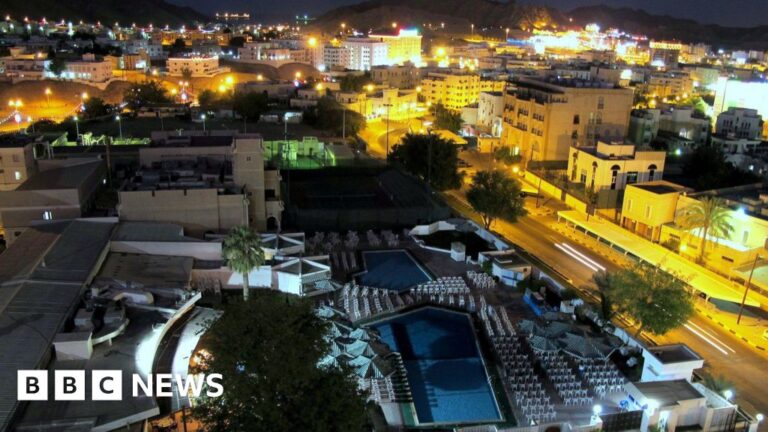- author, David Gritten & Yaroslav Lukiv
- role, BBC News
-
Six people, including a police officer, have been killed and 28 injured in a rare shooting near a Shiite mosque in Oman’s capital, Muscat, police said.
Three attackers were also killed by security forces in the incident, which took place in Al-Wadi Al-Kabir area on Monday night, the statement said.
Police have not released details about the identities or motives of the victims or the shooter, but Pakistan said four Pakistanis were among those killed in the “terror attack” on the Imam Ali Mosque. India also said one of its nationals was killed.
The Sunni Muslim militant group Islamic State (IS) said three of its members were responsible for the attack.
Supporters of the group celebrated the shooting on social media networks.
IS has repeatedly targeted Shiite rituals, processions and worshippers in countries including Iraq, Afghanistan and Pakistan, but has never claimed an attack in Oman, where Shiites are a minority.
A police statement offered condolences to the victim’s family and said investigations were underway into the circumstances of the incident.
He also stressed the need to “obtain information from official sources and disregard unreliable information.”
Pakistan’s Prime Minister Sharif said he was “deeply saddened” by the attack and offered his “heartfelt condolences to the families of the victims.”
“I have instructed the Pakistani embassy in Muscat to provide all possible assistance to the injured and to personally visit the hospital,” he wrote to X.
“Pakistan stands in solidarity with the State of Oman and will fully cooperate in the investigation.”
Pakistan’s Ambassador Imran Ali said in a video message on Tuesday morning that he visited some of the injured at three local hospitals and that their condition was “relatively safe.”
He also advised Pakistanis in Oman to avoid Al Wadi Al Kabir and cooperate with local authorities.
Ali later told AFP news agency that the attackers initially opened fire from a building next to the mosque, where hundreds of people had gathered for prayers.
He said the worshippers had been taken “hostage” by militants but “were later released by Omani forces.”
The Indian Embassy said it had been informed by Oman’s foreign ministry that one Indian national had been killed and another injured, but did not disclose their identities.
The shooting occurred on the evening of the ninth day of the Islamic month of Muharram, a day when Shiite Muslims hold rituals on the eve of the festival of Ashura, an important day marking the martyrdom of Imam Hussein, the grandson of the Prophet Muhammad, in a 7th century battle.
As the attack was underway, a video taken inside the Imam Ali Mosque could be heard hearing some worshippers in the courtyard shouting “Oh God,” “Oh Hussein” and “I am here, Hussein.”
Oman has long been considered one of the most stable and secure countries in the Middle East, which has enabled it to play a leading role in mediation efforts to resolve conflicts and disputes in the region.
The Gulf sultanate has a population of about 4.6 million, of which more than 40 percent are foreign workers.
The government does not publish statistics on religious affiliation.
However, the US State Department estimates that 95% of the population is Muslim, of which 45% are Sunni, 45% are Ibadi, and 5% are Shiite. The remaining 5% are Hindu, Buddhist, and Christian.

